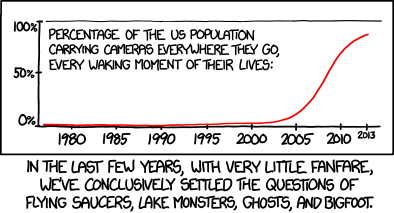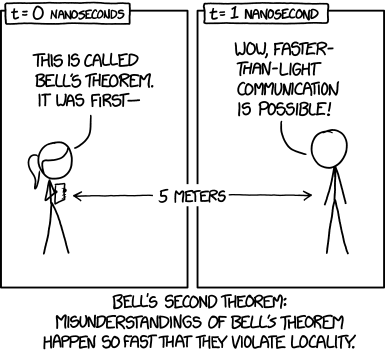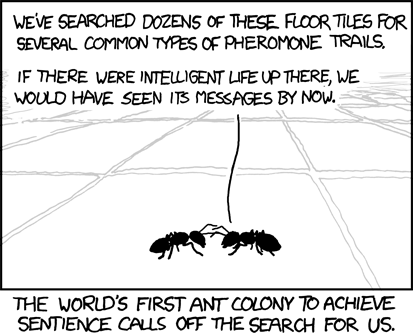

 |
|
|
#51 | ||
|
Head Coach
Join Date: Oct 2005
|
Debbie downer. But probably true.
|
||
|
|

|
|
|
#52 | |
|
Grizzled Veteran
Join Date: Nov 2013
|
Quote:
Also I just get the feeling that military pilots are making reports just to troll us.
__________________
"I am God's prophet, and I need an attorney" |
|
|
|

|
|
|
#53 |
|
Head Coach
Join Date: Oct 2000
Location: North Carolina
|
 |
|
|

|
|
|
#54 |
|
Head Coach
Join Date: Oct 2005
|
Oh com'on, isn't the answer obvious ...
 Last edited by Edward64 : 10-25-2022 at 07:33 AM. |
|
|

|
|
|
#55 |
|
Coordinator
Join Date: Sep 2004
Location: Chicagoland
|
There are no aliens, because if there were, Donald Trump would have found out about them while President and there's no way he would have kept his mouth shut about it.
Last edited by flere-imsaho : 10-26-2022 at 12:29 PM. Reason: grammar |
|
|

|
|
|
#56 |
|
Head Coach
Join Date: Oct 2005
|
Hah. Those type of aliens require some sort of intellectual curiosity which I'm pretty sure he doesn't have.
But you bring up a good point. I have to believe Presidents, Secretary of Defense, and Joint Chiefs would have insisted on knowing if aliens were true. That would be my first directive. The second is to get a personal tour of Area-51. |
|
|

|
|
|
#57 |
|
Grizzled Veteran
Join Date: Nov 2013
|
Did aliens say something about his wife? 
__________________
"I am God's prophet, and I need an attorney" Last edited by NobodyHere : 10-26-2022 at 01:58 PM. |
|
|

|
|
|
#58 | |
|
Grizzled Veteran
Join Date: May 2006
|
Quote:
Or so the Germans would have us believe ... |
|
|
|

|
|
|
#59 |
|
Solecismic Software
Join Date: Oct 2000
Location: Canton, OH
|
It's hard to take questions like this seriously. Gotta keep an open mind, I guess. What would NASA do if it discovered life on another planet? I suppose get funding for an unmanned probe to explore it more in detail. That would logically be the first contact as technology goes.
Our technological timeline is undoubtedly very different than any other potential civilization's. So the overwhelming odds suggest that if there's other life out there, it is either in the very early stages of development, and thus difficult to find and/or recognize, or vastly superior in technology, and thus likely at a stage where probes can travel a much greater distance with higher reliability. In other words, they'll find us before we find them. But... Star Trek's warp drives and wormholes aside, it may not be possible, at any level of technology, to travel great distances in a lifetime. The thought that any civilization out there with the ability to transport living beings across the universe would actually do so without establishing communication first makes no sense at all. Galaxies are hundreds of thousands of light years in diameter. And it's unlikely that anything can travel faster than the speed of light. Or even close, by an overwhelming factor. What does that mean for communication, which would be conducted at light speed? I guess what I'm saying is that whatever sci-fi fantasies we have about aliens, it's not even worth a moment's worry or consideration. Unexplainable UFOs could, in theory, be unmanned probes of some sort, and maybe in 100,000 years or so, we'll hear something from the civilization sending the probe... but why would you send a probe on a 200,000-year journey in the first place? Odds are there's something out there, I guess. Odds are also fairly decent that the concept of two civilizations at any level of development 100,000 years apart even communicating at the most rudimentary level would violate laws of physics that really can't be changed. So... a lot of people think about time travel. Well, the problem there is that it requires time to be a "dimension" that can be traveled. Relativity explains that two beings can travel through time at different rates - but that's time "slowing" or "speeding up" because of motion. It's more than a perception, but time itself doesn't change. To move into a different time would require copies of the universe. Constant copies, each autonomous in its own way. If we thought the physical problem of exceeding light speed was an issue, where does the matter and mechanism for all this constant copying come from? But even if we could play this game, go back in time, "kill Hitler" or something more imaginative, then we "return" to today only to find out that Hitler was never killed in this timeline. Unless the concept of time also includes the concept of an even larger set of gazillions of universes that encompass every possibility for everything. In other words, everything is simultaneously predetermined, yet with infinite possibilities. That's not very entertaining, so the concept of time travel must also include the concept of immediate resolution of time conflicts. So, in an instant, everything that happens between an event altered in time, and the present, must be resolved, and even memory of anything ever being different must be replaced. The implication of that leads us back to the one "true" universe theory, and time travel is thus the ability to alter record-keeping. A far more manageable task that requires no knowledge of physics whatsoever. Therefore, I suggest that time travel is both possible and heavily practiced by governments throughout the world, throughout history. |
|
|

|
|
|
#60 | |||||||
|
Head Coach
Join Date: Oct 2005
|
Quote:
I don't know if I agree with this. They could also be same level of development as us (e.g. starting to explore, being more aware of space). Or slightly more advanced but without means of interstellar travel. Or have advanced and have ceased to exist for one reason or another etc. Or they don't want to expose themselves just yet. In the context of universe being approx. 13.7B years old, I think any are probably just as likely. I am happy if we find alien single cell life, amoebas and like in this solar system before I die. I don't need the Vulcans but it would be nice. Quote:
I think we all grew up with not able to travel faster than the speed of light. I kinda agree with "wormholes aside" but not about "warp". I refuse to believe we cannot near, match or exceed light speed in "some way". We've got weird things happening in the quantum level. We've got the concept of entanglement which arguably (there is debate, no one knows for sure) exceeds the speed of light. We are thinking about theoretical "warp" drives. Quantum entanglement - Wikipedia Alcubierre drive - Wikipedia
Quote:
See above on entanglement. Note, the consensus seems to be that one cannot successfully communicate via entanglement other than in very rudimentary ways. However, just by the fact that entanglement may be (not proven yet) faster than speed of light ... to me, this indicates there is hope. Quote:
This is absolute heresy.  Quote:
Maybe violate classical physics but not necessarily quantum physics/mechanics. Quote:
Yeah, I put time travel on same level as multi-verse. I know the math supposedly provides for the possibility, but not going to believe it (yet). Bottom line. I don't disagree with your overall skepticism. However, I have more hope than you have expressed. |
|||||||
|
|

|
|
|
#61 |
|
Solecismic Software
Join Date: Oct 2000
Location: Canton, OH
|
Theoretical based on quantum physics is fun, but how is it ever going to be practical for objects larger than pretty much nothing?
I don't want to say never, but I think there's a decent chance that never is the answer for cross-galaxy travel, simply because of time. And if you have to wait 100,000 years for the answer to "how you doin'?", what's to be gained? As for timelines, we are in this weird space of a few hundred years within the evolution of a species that's a few million years old in a galaxy that's billions of years old. In the time it would take simply to communicate anything to anyone, our civilization will age considerably. Maybe by the time we get a reply to the first message we send out, our civilization will either be gone (dark ages seem cyclical, and I think we're starting to edge down toward another one) or advanced far beyond the scope of whatever we communicated 100,000 years ago being all that interesting or relevant. If it is possible to improve technology beyond what we think of as the rules of basic physics, then whatever's out there that can communicate with us is not going to be in tech infancy like we must be. But if it isn't, then distance is a limitation that can't be overcome. |
|
|

|
|
|
#62 | |||
|
Head Coach
Join Date: Oct 2005
|
Quote:
I cannot speak intelligently in detail about this but quantum computing is based on quantum physics/mechanics. Quantum computers are "real" but in the embryonic stage. They will eventually revolutionize the computers we are using. This is an example of how theoretical quantum physics becomes "practical". Quote:
I see your point but will point our how far we have come in only 100 years. From beginning of flight to near consumer space travel. From vacuum tubes 50-60 years ago to quantum computing. From Asimov's robots/androids to early stages of that realization. From the initial Turing test to arguably achieving that reality now (and certainly in Chess, Go, and recently in digital paintings). Quote:
I do understand your concern, skepticism about interstellar communication. But as pointed out, entanglement is potentially faster than the speed of light. Therefore, if entanglement is possible, why not something else yet to be discovered. There was classical Newtonian stuff, then classical physics, now (yet to be fully understood) quantum physics/mechanics. Similarly apply this to other scientific but non-physics disciplines. Let's put it this way. I am willing to bet all the greatest minds since Einstein and prior would be amazed at the progress we have made since their time. Although skeptical of quick resolution, I do leave room for the vast potential of human ingenuity to figure things out and supersede current limitations. Last edited by Edward64 : 10-26-2022 at 10:42 PM. |
|||
|
|

|
|
|
#63 |
|
Solecismic Software
Join Date: Oct 2000
Location: Canton, OH
|
Regarding quantum computing, I was specific, practical for objects larger than pretty much nothing. Which is exactly what they're proposing. Not that anyone could step inside one of those proposed computers and travel to another galaxy.
Certainly, we can't even conceive of what might be invented 100 years from now. The question is whether there are physical limitations on the particles that make up the universe. On the particles that make up the human body. Not what we can do within those limitations. |
|
|

|
|
|
#64 | |
|
Grizzled Veteran
Join Date: May 2006
|
I have a bit of a different take on this, but I agree that the whole question is irrelevant right now.
Quote:
I've asked the question you pose in the first sentence to people who are really excited about aliens and not gotten a good answer. I think the best we could hope for is to invest more in faster forms of communication/propulsion, but there's literally nothing useful we could do now. Let's assume we discovered aliens at Proxima Centauri tomorrow. Let's further assume we could immediately launch a ship/probe/communication drone/whatever in that direction, capable of traveling for indefinite periods 0.5% of the speed of light, which is about an order of magnitude faster than we've ever achieved even briefly. Obviously we can't accomplish anything remotely close to that. But let's just say we could for the sake of argument. This hypothetical ship would take almost 850 years to get there. That means it is a complete and total waste of time unless we can't double our propulsion speeds in the next four centuries plus, or increase them by 50% in the next almost three centuries, and so on. Any other star would be far more distant and even more absurd. So that's the 'finding life in another star system' scenario. It's not just that it's better to improve our spacefaring technology first, it's the fact that this would be the only sensible option. On the other hand, if aliens have visited our solar system, they are either so good at hiding that we can't detect them, or they are not interested in making contact with us. Perhaps they're waiting for us to make some breakthrough first. Same answer there. Get better at detecting, communicating, moving about in space. And there are many other possibilities too of course. Maybe they are waiting for us to be at 'peak harvesting condition'. Perhaps they've seen how we treat our planet and concluded we are unfit to be contacted, not ready, and likely to kill ourselves off so they are waiting for us to do that, then they'll colonize what's left of our system. Maybe they are so advanced compared to us that physics we can't understand are what they teach to what we call elementary education level. i.e. we are so far beneath them intellectually, culturally, and so forth that contacting us would be like us trying to form a first contact with the anthill in our backyards. I think all of these any many others are possible. And at times, fun to think about. As matters of serious inquiry and consideration for the purpose of taking any immediate, practical action? Hard nope on that. Unless the aliens, if they exist and are nearby, intervene and make contact, there is nothing we can do in our lifetimes or that of many generations into the future that makes direct practical sense. Last edited by Brian Swartz : 10-27-2022 at 12:42 AM. |
|
|
|

|
|
|
#65 |
|
Grizzled Veteran
Join Date: May 2006
|
Forgot to add; there are also the theoretical challenges to the Fermi Paradox. Solecismic mentioned one, the very real possibility that traveling sufficient distances probably isn't possible. If it is, I'd say that raises even more problems.
One though experiment is this. Say a civilization colonized one star system, then doubled every 50 years. That is, next generation they colonized two. Then four. Then eight, and so on. This is not at all an unrealistic pace if you have the technology to move at reasonable speeds between star systems. Assume every star has planets to colonize (they don't). In a few thousand years, you've colonized the galaxy. This would have happened hundreds of times over by now, even if intelligent alien life is incredibly rare. Rare Earth Hypothesis is still out there (conditions for advanced life are far more rare than many think). Or FTL travel isn't possible. Or, the same drivers of interstellar exploration and colonization would cause any such civilization to tear themselves apart. That is, a species with the intelligence and ambition to do that might also inevitably be one that that would splinter through conflict over the resources and destroy it's capablities to operate on that scale. Or many other problems that I/we haven't thought or heard of yet. Last edited by Brian Swartz : 10-27-2022 at 01:01 AM. |
|
|

|
|
|
#66 |
|
Hall Of Famer
Join Date: Apr 2002
Location: Back in Houston!
|
Wait but why has a fun read on the Fermi Paradox:
The Fermi Paradox - Wait But Why (also, their one on AI is brilliant but a bit scary) SI
__________________
Houston Hippopotami, III.3: 20th Anniversary Thread - All former HT players are encouraged to check it out! Janos: "Only America could produce an imbecile of your caliber!" Freakazoid: "That's because we make lots of things better than other people!" |
|
|

|
|
|
#67 | ||
|
Head Coach
Join Date: Oct 2005
|
Quote:
I may have misunderstood the highlighted then. Quantum physics/mechanics --> led to Quantum computing/computers which "is (an) object larger than pretty much nothing". Can you expound on what your bolded section meant? EDIT: Re-reading your note, it may be that you are asking the question how can Quantum physics/mechanics lead to interstellar travel/communication "for objects larger than pretty much nothing". No one knows. But per my example, there are real life, practical applications, (not just theory fluff) as a result of quantum physics/mechanics. Doesn't the idea of entanglement being (possibly) faster than speed of light provide enticing possibilities? It'll take time to prove things out. Heck, entanglement stuff came out in 1930's or so, and we still don't understand it. Quote:
There may well be physical limitations on particles that make up the universe. I don't concede that we've found all those particles and we definitely don't understand how/what on some of the particles we have already found. Therefore, that leaves plenty of "room" for more to be discovered (e.g. interstellar communications, travel etc.). Not a big proponent of multiverse but I read a blurb that laws of physics may also differ between multiverses. That kinda blows my mind. My main point is there is so much "more" to be discovered. I am unwilling to concede that we cannot do faster-than-speed travel or communication. Last edited by Edward64 : 10-27-2022 at 09:48 AM. |
||
|
|

|
|
|
#68 |
|
Head Coach
Join Date: Oct 2005
|
|
|
|

|
|
|
#69 |
|
College Prospect
Join Date: Oct 2020
|
Math says there is or has been life out there at some point.
Even if there is intelligent life out there, we have 3 basic ways of looking at it, basically in line with the Fermi Paradox: 1. They're not as advanced as us 2. They're roughly as advanced as us 3. They're more advanced as us If it's 1 or 2 then we won't talk with them in our lifetime. If it's 3, then we can't talk with them in our lifetime. We can barely speak Latin and that was the main language 500 years ago. We figured out writing a few thousand years ago. We'd be lost trying to communicate with cavemen. There's literally no chance that if aliens were advanced enough to be able to try to communicate that we'd have any understanding what they were saying, or that they remembered how to speak to such a low order of life. |
|
|

|
|
|
#70 | |
|
Head Coach
Join Date: Oct 2005
|
I like how this is stirring up conversation. Interesting thought exercise ...
Quote:
If you both are saying there's "nothing useful/practical we can do now" when it applies to "communicating/reaching out" to alien life. I don't disagree. But that's doesn't mean there isn't anything useful we can do now (e.g. after finding life) If/when we've found intelligent life (same or more advanced than us) in Proxima Centauri (let's say SETI finds a consistent, reproduceable signal) ... Beyond a lot of religious & philosophical rationalization, recalibration etc. there will be a renaissance of interest in research, technologies etc. Sure, we won't be able to communicate with them, but the impact of discovering intelligent life elsewhere will be an impetus for greater things to come. There was a StarTalk episode and I (greatly) paraphrase the idea. So many things we know and have now are attributable to space research and the need to innovate. I can see that happening as we realize we have galactic siblings and try to reconnect Last edited by Edward64 : 10-27-2022 at 10:12 AM. |
|
|
|

|
|
|
#71 | |
|
Head Coach
Join Date: Oct 2005
|
Quote:
Related to the Rare Earth Hypothesis, it's focused on "complex" life like on Earth. I can see that and can see multitudes of reasons why they would be difficult to find or don't exist anymore (e.g. we missed their 2M years by 5 years). However, the odds are much higher for alien single cell life, amoebas and like are living somewhere out there. My hypothesis of a renaissance after discovering intelligent life also applies to if we find alien single cell life, amoebas on Europa. |
|
|
|

|
|
|
#72 | |
|
College Prospect
Join Date: Sep 2005
|
Quote:
I think this line of thinking has a lot of merit. If this all played out, you would think we would of picked up signs. From what I have read, the whole, "the universe is huge, it must be teaming with life" argument has lost a lot of momentum since we have been able to look at so many star systems. When I zoom out it doesn't seem to make a lot of sense that we are "special" though, with all this wasted space. Perhaps as Biological entities evolve taking over the universe/galaxy will lose it's appeal. We live in some sort of metaverse that is more appealing than reality. Computer programs answer all out questions so we don't need to physically explore/expand. Perhaps advanced intelligence simply leads to self destruction. Simulation theory, also doesn't seem impossible. Nothing we perceive is real. Being the creation of a more advanced civilization in some way, is in the same ball park of likelihood as being created by some sport of "god" for me. My conclusion is I have absolutely no idea what's going on. It all seems a little odd. Last edited by Hammer : 10-27-2022 at 10:24 AM. |
|
|
|

|
|
|
#73 | |
|
Solecismic Software
Join Date: Oct 2000
Location: Canton, OH
|
Quote:
By all means, don't concede anything. I wouldn't, either. We may be looking at a physical barrier to faster-than-light travel (or anything remotely close for objects larger than photons), but that doesn't mean we shouldn't keep trying. As for entanglement, fascinating stuff. One can imagine that the properties that allow tiny particles to approach light speed can allow them to work together to "transport" larger objects at the same speed. It's like parallel computing, only tangible. But nowhere in entanglement theory is there any hint that anything can travel faster than light. Without breaking the light barrier, we do not have any ability to communicate with any sentient life form. Keep in mind that if we're looking for signs, what we "see" out there is ancient history. Are two planets, separated by galaxies, at the same level of development? Who knows. All we can know is where they were hundreds of thousands or even millions of years ago. I still maintain that where we are right now, in a pocket of hundreds of years on a planet that's billions of years old, is the infancy of technology. The odds of anything being at the "same" level we are, developing in the same way, even using the same senses of the spectrum... not even worth consideration. Therefore, right now, given our light-speed barrier, it makes sense to broadcast something simple and ordered, just in case something far more advanced is out there with the ability to see it as a sign of sentient life. But it doesn't make sense to behave like anything is out there. If there is and we can communicate, they'll have to take the lead because they will have been the ones to go beyond light speed. Also, given the randomness of our being where we are in 2022 (arbitrarily measuring 0 as a tiny percentage of the time even human beings have been on the planet), who's to say our planet hasn't been contacted before and dismissed as too primitive even to recognize contact? In all reality, we are nothing to the universe, can't even recognize if anything is out there, until we solve the light-speed problem. So if it's unsolvable because of physical limitations on the universe, then what's out there will remain out there. You mention the multiverse. This brings the question of copying into the equation. A computer is the sum of the current status of the terabytes of data it contains. Even that storage requires some physical space. What if every instant, and every possibility for the future, had to be stored as well? That requires copying and recording the current status at every instant. Nearly infinite storage is required at every instant. Then infinite times infinite. Where do you get all this storage or even the mechanism for copying? Occam's Razor surely eliminates the rationale for the multiverse theory. Yet it seems to be a requirement for time travel. Even if the light-speed problem is solved, it doesn't enable time travel. There's "sounds impossible, but why not think about it and maybe it won't be impossible in 100 years" - that's the light-speed problem. And then there's multiverse and time travel and all that. I don't want to say impossible, but I'm more likely to wonder if kids can really attend Hogwarts and dream about the Triwizard Tournament. |
|
|
|

|
|
|
#74 |
|
This guy has posted so much, his fingers are about to fall off.
Join Date: Nov 2000
Location: In Absentia
|
Having visited Roswell several weeks ago and spending about an hour in a museum (which included a "research library"), I can confidently state that I can lend absolutely nothing to this discussion based on what I learned.
__________________
M's pitcher Miguel Batista: "Now, I feel like I've had everything. I've talked pitching with Sandy Koufax, had Kenny G play for me. Maybe if I could have an interview with God, then I'd be served. I'd be complete." |
|
|

|
|
|
#75 | |||||
|
Head Coach
Join Date: Oct 2005
|
Quote:
I do not believe anything is "proven" yet but there are definitely "hints" that entanglement exceeds faster than light. The debate I think we are having is "besides quantum particles, there is not any hint that anything else can exceed" the speed to light. I don't dispute this but I leave the possibility of us learning of other ways as we try to better understand entanglement. 400 Bad Request. Quote:
I have a problem with the multiverse especially that version that says multiverses exist for every possible scenario, event that occurs. However, I don't think we can translate our DASD, FDD, SSD storage issue and apply it here. I can't speak intelligently about it, but Math tells us there is possibility of multiverses (and that probably trumps Occam's Razor as that is limited to our personal biases and understanding). Quote:
Kids 100 years ago would view the technology that we have now as "Hogwarts magic". So yeah, there is plenty of room for kids to attend future Hogwarts 100 years from now. And have us solve space travel/communication issue. Last edited by Edward64 : 10-27-2022 at 02:24 PM. |
|||||
|
|

|
|
|
#76 |
|
Solecismic Software
Join Date: Oct 2000
Location: Canton, OH
|
We can hypothesize that entanglement is a kind of coding that produces the observed behavior. That's not inconsistent with a hypothesis that light speed cannot be exceeded.
This whole different angle of observation approach is just saying that we don't have the technology at this point to decipher the "programming" of a quanta in its entirety. The idea that two tiny particles can communicate complex information across any distance at any speed... that's not following Occam at all. I don't want to say impossible, but it looks like magic now, and I won't be around to find out if it still looks like magic in 100 years. |
|
|

|
|
|
#77 | ||
|
Head Coach
Join Date: Oct 2005
|
Quote:
I know I'm reaching the extent of my knowledge here on entanglement. All I can say is refer back to articles that seem to show it is inconsistent with what Einstein said about FTL. There's plenty of them but admittedly, the verdict is still out. Quote:
It is fascinating to me that this entanglement "conundrum" has been around for 80+ years or so and it's still a conundrum now. It is obvious there is a significant gap in our knowledge. Newtonian physics --> classical physics --> special relativity --> quantum physics/mechanics --> ???? Last edited by Edward64 : 10-27-2022 at 02:50 PM. |
||
|
|

|
|
|
#78 | |
|
Head Coach
Join Date: Oct 2005
|
Quote:
Should have stayed at a Holiday Inn Express! |
|
|
|

|
|
|
#79 | |
|
Head Coach
Join Date: Oct 2005
|
Speaking of Entanglement, 3 scientists shared the 2022 Nobel Prize
Explorers of Quantum Entanglement Win 2022 Nobel Prize in Physics - Scientific American Quote:
Look at first 5 min to understand the basics. It then goes on deeper and I got lost. https://www.youtube.com/watch?v=US7fEkBsy4A |
|
|
|

|
|
|
#80 |
|
Solecismic Software
Join Date: Oct 2000
Location: Canton, OH
|
Interesting video. I think I followed it. What's disproven is the concept that what they're measuring is affected by the process of the measurement itself. The entanglement is consistent regardless of how it's measured.
Then there's a brief diversion into whether the universe can "conspire" to manipulate the piece of the experiment which was designed to invalidate the theory in the first place. Sounds more religious than a legitimate speculation. Finally, some practical analysis of the mechanisms used in this experimental design that give some insight into how a quantum computer could work. But what hasn't yet been shown is whether the information required to produce entanglement is a complex, but ordered set of behavior built into the quantum particles themselves. It's apparently down to either that, or faster-than-light communication. Still very much worth investigating, but I have to use Occam to lean toward the complex functions. Our powers of observation are still so limited that it takes Nobel-level work just to design and carry out experiments that advance the science. To go into that communication argument still would require complex functions, just not quite as complex because the information needed to set the current state would be what's communicated. We tend to think of ourselves at this moment in time as uniquely enlightened in history. It's why, when we imagine distant civilizations, we can even consider the possibility that a state exists that's similar to where we are in 2022. But we aren't that special. And 100 years from now, in 2122, people will look back it 2022 and consider us primitive and kind-of evil. Same as we consider the enlightened people of 1922. We crave feeling uniquely enlightened. Why would we care to hear about anything that's not notable? The stories about Hogwarts are narrated from Harry's perspective. Who would want to read about Hogwarts from the perspective of the guy who sleeps in the same dorm, but only hears about battles with monsters third-hand, and his only direct interaction with Harry is in trusting his mother's prejudiced opinion that Harry is actually in league with the devil? I wouldn't want to read that. |
|
|

|
|
|
#81 |
|
This guy has posted so much, his fingers are about to fall off.
Join Date: Nov 2000
Location: In Absentia
|
Ironically, we spent 5 of our 7 nights in NM at 4 different HIEs - but I "paid" for all 5 nights with points, and the expertise part only comes with fully paid rates.
__________________
M's pitcher Miguel Batista: "Now, I feel like I've had everything. I've talked pitching with Sandy Koufax, had Kenny G play for me. Maybe if I could have an interview with God, then I'd be served. I'd be complete." Last edited by Ksyrup : 10-27-2022 at 04:52 PM. |
|
|

|
|
|
#82 | |||
|
Head Coach
Join Date: Oct 2005
|
Quote:
I believe you are referring to "hidden variables" (e.g. we can't see them or know how to detect the variables/attributes yet) in or between the 2 entangled particles. What I've read/seen is there are no hidden variables, it's the equivalent of a flowchart's "and magic happens here box". Bell's theorem and the findings was in the video. Bell's theorem - Wikipedia Quote:
Quote:
In other words, it does seem that 2 entangled particles interact/communicate (whatever the word is) once they are measured/observed, and not because they had these predetermined hidden variables already. I know, I don't get it but that's what the eggheads are saying. It's what Einstein called it "spooky magic at a distance" and said there are/had to be hidden variables, and he has (so far) been proven wrong. It's magic. I've seen an explanation as to possibly why/how because it's a "wave function" shared between the 2 particles but it still does not explain how it works (theoretically and magically) faster than light. Last edited by Edward64 : 10-27-2022 at 05:44 PM. |
|||
|
|

|
|
|
#83 |
|
Head Coach
Join Date: Oct 2005
|
|
|
|

|
|
|
#84 | |
|
Solecismic Software
Join Date: Oct 2000
Location: Canton, OH
|
Quote:
There's one more piece. The experiments showed local variables aren't at work, but not that the entire function of disentanglement might contain all that's needed to maintain the relationship. Measurements are still very elementary at this point. Einstein hasn't been proven wrong. Nor is he necessarily correct. He is certainly not around to add to the discussion, since time travel is impossible. What he meant by "spooky magic" is the concept that instantaneous communication is possible at any distance. If it is taking place, a remarkable leap that violates what we think we know about physics, we can't yet even come close to showing it. Maybe there's a future Nobel winner designing those experiments right now. |
|
|
|

|
|
|
#85 | |
|
Head Coach
Join Date: Oct 2005
|
Quote:
Agree. It would be fantastic. FWIW, I googled on "Stephen Hawking entanglement" just to see if he did any work here. Didn't find much, he was more of a Black Hole guy. |
|
|
|

|
|
|
#86 | ||||
|
Grizzled Veteran
Join Date: May 2006
|
Quote:
I agree with the rest of your post, but this doesn't make sense to me. I think a highly advanced alien species would have a very good chance of being able to communicate with us. Not immediately a la universal translators or whatever, but after a period of observing us and studying us I don't see any reason why they couldn't learn our languages. Quote:
Quantum mechanics, specifically the way entangled particles communicate over time and the whole disconnect between quantum mechanics and general relatively, or physics of the large and small, really is a strong point in favor of simulation theory to my mind. I think it's unprovable, but also not particularly unlikely. Quote:
I don't think this renaissance has any chance of occurring short of discovering advanced alien life near enough to be meaningfully interacted with. We already think there were at one point microbes on Mars for example. We can't prove it, we don't have an example of one, but we could find one and I don't think it moves the needle an inch. Even advanced alien life discovered in another system wouldn't do that much. There would be a flurry of activity briefly, but I don't think it would sustain at all. Look at the way we deal with crises like climate change and Covid and 'fill in the blank with whatever'. We don't plan ahead well. We'd rather adapt when something becomes an immediate issue. Long, medium, and even short-term beyond the immediate future are not things humans generally are good at; i.e. we aren't going to sacrifice the now for something that doesn't have practical value to us. Most people would just say 'cool', or deny it, and some people would go nuts, but society as a whole isn't going to change it's direction or have some massive new investment in science as a result. The majority would literally not care. He's far from the only voice, but this lecture by NDT is one of the best I've heard on this kind of thing: The Future of Colonizing Space A few bullet points: - Predicting the future is super-hard and we suck at it - There are limited reasons people are willing to spend the time and money for major long-term investments on. Security aka not dying and economic return being the biggest ones. Let's just explore, or invest in this so we can doing something really cool hundreds or thousands of years from now don't qualify. - Example of the Apollo program, why we started it and why we pulled back on the space program in general backing this up. Quote:
This is true, but here's something else that is true. The furthest manned mission we had done from the Earth in 1970 was going to the moon. The furthest manned mission we have done in 2020; also, going to the moon. We've explored more and gone faster in our solar system (and with Voyager a bit beyond that, but again those launched over 40 years ago). In other words, there's no good reason to assume we're just going to keep on making progress (also covered in that video). We will make progress in areas that are practically important to us, certainly. In those that aren't? Nope, not gonna happen as anything more than a side effect of more important pursuits. I think it incredibly unlikely that 100 years from now we will have solved traveling between star systems. Permanent colonies on Mars and the Moon, industries and mining and economic development happening in space near Earth and on the Moon, that is more than enough for us to tackle in the next 50-100 years. And at a certain point it's likely to tip and have a lot more investment, but even there I think we will get to the point of having large-scale economic operations within our system centuries before we even think about being able to travel between stars effectively, if that is even possible. Or to look at it another way, that goal is like discovering how to smelt steel and then saying 'ok tomorrow we'll build a rocket that can escape the atmosphere'. There are so many steps that have to happen in between there. Last edited by Brian Swartz : 10-27-2022 at 06:49 PM. |
||||
|
|

|
|
|
#87 |
|
Head Coach
Join Date: Oct 2005
|
Believe, you unbelievers!
I have told my wife that I would volunteer for a one-way trip to somewhere.  Last edited by Edward64 : 10-27-2022 at 06:42 PM. |
|
|

|
|
|
#88 | ||
|
Head Coach
Join Date: Oct 2005
|
Quote:
Hmmm, haven't thought about this angle. To me, a little too much like multiverse which my brain refuses to comprehend right now because of all those Marvel characters popping in-and-out. I will have to read up more on this though. Quote:
I can't disagree with this but I think the opposite reaction is also quite possible. The US (and allies) would be incented to establish and reap the benefits of first contact somehow with intelligent life. I'd see another "interstellar/interstellar communications" race. The next generation of Elon Musks (hopefully without the baggage). For single-cell and amoebas in Europa, I was thinking about live vs fossilized. I can only imagine the race to get live samples, study their DNA, somehow monetize the findings etc. It would be incredible. Last edited by Edward64 : 10-27-2022 at 06:54 PM. |
||
|
|

|
|
|
#89 |
|
Head Coach
Join Date: Oct 2000
Location: North Carolina
|
 |
|
|

|
|
|
#90 |
|
Head Coach
Join Date: Oct 2000
Location: North Carolina
|
 |
|
|

|
|
|
#91 |
|
Head Coach
Join Date: Oct 2005
|
More for the unbelievers.
 |
|
|

|
|
|
#92 | |
|
Head Coach
Join Date: Oct 2005
|
Wonder if we can or even think its worthwhile to get there and check it out.
Single-cell, amoebas ... please God, anything living (or a mummified humanoid) Space rock slams into Mars and reveals buried ice | CNN Quote:
 Last edited by Edward64 : 10-27-2022 at 09:20 PM. |
|
|
|

|
|
|
#93 | |||
|
Grizzled Veteran
Join Date: May 2006
|
Quote:
Not sure if I've linked this to you before. Down The Rabbit Hole of the Delayed Choice Quantum Eraser It's from Joe Scott. He doesn't go full simulation theory here (has other videos talking about that possibility), and the whole video is good IMO, but the money quote to my mind is at 10:00 Quote:
In terms of simulation theory, the basic idea is that if we don't ever find a theory of everything, basically whoever designed this simulation made it so that only the stuff above a certain size was tracked in the 'general relativity way'. Small molecules roughly on down can use this other way where we don't have to know what's happening with it basically until it interacts with something. Keeps the whole simulation from requiring too much bandwith/processing speed. Quote:
I think that gets back to the timescale. If it takes thousands of years to send and receive a message, no. If it takes hundreds, again no. If you can get to the point where it can be feasibly done without bankrupting your country within a couple of decades, sure. But if that question is asked today the answer is a resounding 'no, we're not remotely close'. |
|||
|
|

|
|
|
#94 |
|
Grizzled Veteran
Join Date: May 2006
|
Want to echo what Edward said, to everyone; good talk. Glad this many people joined in.
|
|
|

|
|
|
#95 | |
|
Head Coach
Join Date: Oct 2005
|
Quote:
Thanks, I like Joe. I was aware of and been discussing the "non-locality" (across space) of entangled particles in this thread but did not know about "non-temporality" (across time). I thought entangled particles communicating/interacting/whatever in FTL is weird, it seems there is some evidence they can also do same across time. He didn't get into simulation theory in the video. But I'm reading up on it now. |
|
|
|

|
|
|
#96 |
|
General Manager
Join Date: Nov 2002
Location: The Town of Flower Mound
|
__________________
UTEP Miners!!! I solemnly swear to never cheer for TO |
|
|

|
|
|
#97 | |||
|
Head Coach
Join Date: Oct 2005
|
Read some articles and watched some videos. Here's the foundation & context of simulation theory.
Quote:
Quote:
Quote:
Last edited by Edward64 : 10-28-2022 at 10:48 AM. |
|||
|
|

|
|
|
#98 | |
|
Head Coach
Join Date: Oct 2005
|
I guess it's possible we are living in a simulation. But it's just as easy to believe we are at #1 or #2 or the #3.a "programmers" or #3.b "God".
If I had to accept either 3.a or 3.b, I'll take the 3.b God angle. It's more comforting to think of God vs some nerdy, fat-ass programmer maintaining this simulation while dripping pieces of philly cheesesteak sandwich (or sushi) over his keyboard. For 2 ... There's a good chance I rather play future (Stellaris, X-Com, Space Rangers, Fallout) vs history (Civ 6, Sims). So I wouldn't call it zero but I'd say good chance I would NOT be interest in running simulations of my evolutionary history. So why are people so convinced we are in a 3.a simulation vs 1, 2 or 3.b? Last edited by Edward64 : 10-28-2022 at 11:14 AM. |
|
|
|

|
|
|
#99 |
|
Solecismic Software
Join Date: Oct 2000
Location: Canton, OH
|
If this is all a simulation or there's a god, what created the programmer, and why?
Seems like we're forever inventing convoluted mechanisms to make us feel more significant than we are. |
|
|

|
|
|
#100 |
|
Head Coach
Join Date: Oct 2005
|
And I'll toss out a #4
... or #4. We evolved/transferred our brain, consciousness etc. into an android shell (you get the idea) and are exploring the universe. We are beyond "playing" games on "simulations of their evolutionary history". I think the insistence on "ancestor" simulations doesn't ring true to me. Last edited by Edward64 : 10-28-2022 at 11:31 AM. |
|
|

|
 |
| Currently Active Users Viewing This Thread: 3 (0 members and 3 guests) | |
| Thread Tools | |
|
|